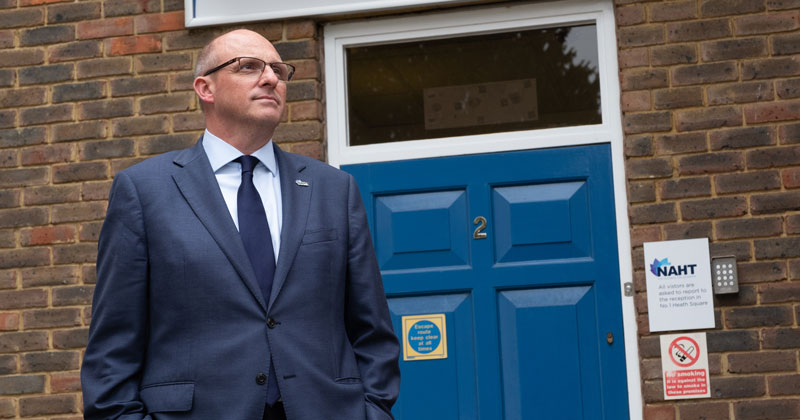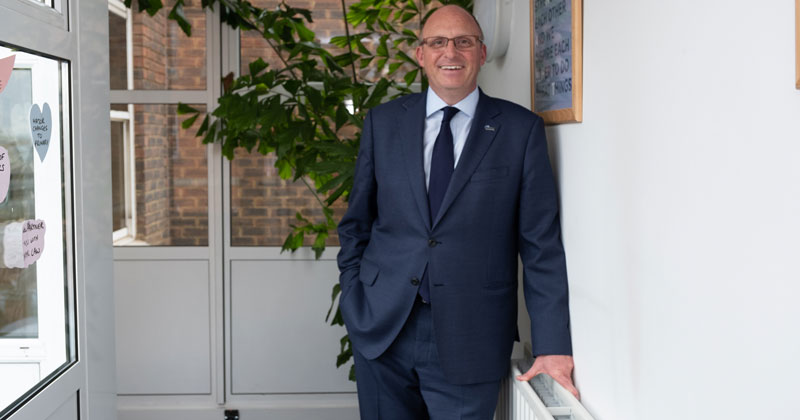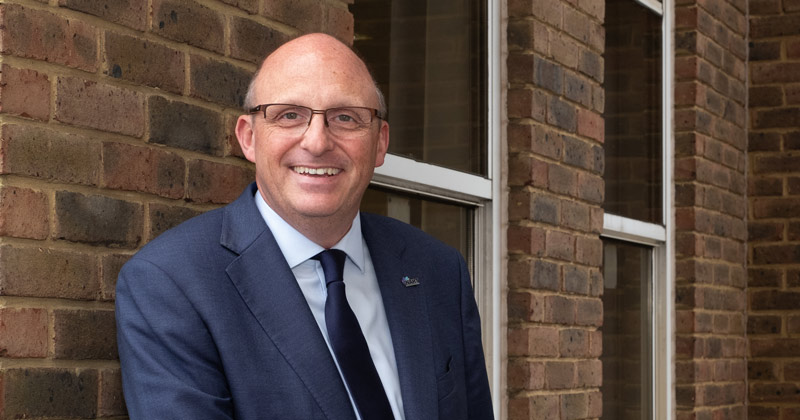Almost a year to the day since he was unveiled as the NAHT’s preferred candidate to replace Russell Hobby as its general secretary, Paul Whiteman is preparing to deliver his inaugural keynote speech at the union’s annual conference.
But Whiteman’s address in Liverpool this weekend will be delivered under very different circumstances to his predecessor’s last year. For one thing, he won’t have the leader of the opposition as his warm-up act.
Last year’s eventful conference – held less than six weeks before election day – saw Jeremy Corbyn receive a hero’s welcome while Justine Greening, then the education secretary, was a no-show.
There may be no general election this year, but Whiteman insists he still wants his members in campaign mode as they prepare to debate and set policy on the biggest issues facing schools across the country.
Headteachers and all school leaders have a duty to speak up for the children in their care
“Headteachers and all school leaders have a duty to speak up for the children in their care, and it doesn’t matter whether there’s an election running,” he tells me. “It doesn’t matter what colour of government we have; they have a duty to say when things are going wrong in their schools.”
A few weeks before the conference, we meet in a café minutes from Congress House in Holborn, where Whiteman is due to meet other leaders at a Trades Union Congress event. Ever the millennial, I order avocado on toast; Whiteman just has coffee.
He is tall, bespectacled, and a proud south Londoner with an accent to match. He still lives in Croydon, where he was born, and when he arrives he mumbles something scathing about the trains that made him a little late to our meeting.
It is poignant that we meet before he heads to the TUC. He was born into a union family. His father was an official with the Banking, Insurance, and Finance Union, which Whiteman joined when he started work at the Orpington branch of TSB in 1986 at the age of 18.

He first became active in the union in the early 1990s. Banking was changing and, by then a branch manager, he watched as technology transformed the way people looked after their money, and “massive redundancies” followed.
“I was a little bit mouthy,” he tells me, a cheeky smile on his face.
However, he was reluctant to follow in his father’s footsteps and become an elected official. There was a “kind of unwritten understanding” between the two men, he says. Whiteman junior focused on his career, while Whiteman senior tended to the union.
Following his father’s retirement, though, the son was quick to roll up his sleeves.
You only had to look at me to know I had ambitions
As an elected official, he rose through the ranks, eventually chairing the union’s Lloyds TSB committee, which represented all members within the newly-merged bank.
At the age of 30, he applied for a union bursary to study for a master’s in industrial relations and employment law at Keele University.
He confesses “with slight embarrassment” that he “didn’t really enjoy school very much”, had snubbed further study after his A-levels, and “hated every minute” of his banking exams. But the chance to study as a mature student was different.
“I absolutely adored it. The difference was that when I did the banking exams, I was young, I was still living at home, I was completely free to do what I wanted to do, but when I did the master’s I was 30, three kids under three, a full-time job and I was active in the union.”
Two years of “very little sleep” later, and Whiteman found his first full-time union job at the First Divisional Association, a union for senior civil servants where he spent a decade representing government department permanent secretaries, NHS chiefs, Ofsted inspectors and other important officials.

A decade later, in 2012, he joined the NAHT to run its representation and advice division, which included its legal team and regional offices, dealing with “the misery and conflict on the ground”.
Five years later, when Hobby announced he was moving to Teach First, Whiteman was at the front of the queue to replace him.
“When he decided to go, you only had to look at me to know I had ambitions,” he says, admitting that Hobby had tipped him off ahead of his announcement, and told him to be ready.
“He was an absolute gentleman. I had a bit of notice to get my head round the fact that he was going.”
To the outside world, Whiteman’s appointment looked seamless. Hobby announced his plans to go in January last year, and Whiteman’s name was announced to members at the union’s conference in April. But behind the scenes, a “torturous” appointment process had gone on.
“It was a really competitive process, actually. It started with a meeting with a headhunter firm, then three lots of testing, psychometric testing, including things like verbal reasoning,” he recalls.
“Then we had an appointment workshop centre thing, an assessment centre. Over two days. Part of that included interviews with all sorts of different panels, so everybody in the union got a bite.”
My experience is that industrial action of any description is always tremendously painful and disruptive
Having passed the plethora of tests and panels, Whiteman took the reins at a tumultuous time for schools.
Now the challenge for leaders is to keep hold of the momentum started by the success of the school cuts campaign in bringing education to the forefront of last year’s general election. He wants heads to keep fighting, and rejects criticism levelled at leaders who spoke out about funding last year. He also insists the NAHT will never be partisan.
Unlike Hobby, who upon his appointment in 2010 admitted to being a card-carrying Labour Party member and remained so throughout his tenure at the NAHT, Whiteman refuses to reveal his own political leanings.
“It doesn’t matter. My job very much is to be non-partisan,” he says, matter-of-factly, “and I’m not going to let you draw me on it.”
His trade union background is “pure”, he says, because he’s always sought to articulate the voices of his members and their profession, rather than use it as a platform to pursue political ambitions.
So what will a Whiteman-led NAHT look like? With tension continuing to build over school funding and teacher pay, will heads finally join classroom teachers on the picket line under his leadership?
He is clear that strikes would be “an action of last resort”: “My experience is that industrial action of any description is always tremendously painful and disruptive.”

But the situation is nevertheless very serious, he admits. If the government’s teacher pay review body recommends a larger-than-usual rise this year he fears heads may have to refuse to implement it unless more cash comes from central coffers.
Are politicians ignoring the worsening situation in schools? Or are they just blissfully unaware? He gives them more credit than that.
“I still think that at its core, politics remains an honourable profession, and people are trying to do right,” he suggests. “I don’t think they’re blind. I don’t think they’re ignoring it. But they are making conscious political decisions about where to spend money and where to spend the nation’s wealth. And they stand or fall on those conscious decisions.”
At its core, politics remains an honourable profession, and people are trying to do right
Under his leadership, he hopes the NAHT will be the “authoritative voice” of education leadership, a body that “isn’t afraid to say difficult things in a public space”. He insists that the NAHT retain its own culture and brand, and resists calls for his organisation to merge into the National Education Union.
Still, the lifelong trade unionist in Whiteman is clearly excited by the formation of the NEU, now the largest education union in Europe and the third largest in the world.
“It’s fantastic. I wish them very well with it, because it will be a very powerful and no doubt credible force.”
Before we part ways, an animated Whiteman describes his “fantastic” first nine months in the job, during which the “biggest shock” was a discovery that his admiration for school leaders could grow.
“Over five years I developed a depth of respect for and liking for the profession. But nine months into this job, when you’re frequently out in schools and you’re really seeing it, it just blows your mind every time.”
It’s a personal thing
What’s your favourite book?
I guess the first one that really stuck in my mind was The three musketeers. I read it when I was young and then I reread it as I got older, and the two bits of enjoyment were completely different.
As a youngster it was the swashbuckling, riding all over France stuff, then the political intrigue when I read it as an adult was really entertaining. But, I guess if you push me for my absolute favourite, that would be To kill a mockingbird.
What’s your favourite cuisine?
Italian. Every time. Dead easy.
Your favourite place to visit abroad
Probably Barcelona. I don’t go very often, but it’s blown my mind and I know I’ll be a frequent visitor, there’s no doubt about that.
…and at home in Britain
I’m a Londoner, and I love London. Absolutely adore London, but if I’m going to disappear somewhere to relax it’s north Devon, generally around Croyde Bay, which I discovered when I was a teenager. I was 17, and we all saw ourselves as being part of the British surfing community and we were going down to surf, three of us in a two-man tent on a campsite.
It was certainly character-building if nothing else. I had pretty much all the kit, but you can see, the long hair has fallen out. Surfing in the snow at Easter was not fun, but it was a great time and I’ve been returning with family ever since. It’s a fabulous place to be.
CV
2017 – present: General secretary, National Association of Head Teachers
2012 – 2017: Director of representation and advice, NAHT
2002 – 2012: National officer, FDA (the civil service union)
1998 – 2000: MA in industrial relations and employment law, Keele University
1997 – 2002: Elected official, Unifi (previously the Banking, Insurance, and Finance Union)
1986 – 2002: Bank clerk and manager, Lloyds TSB (previously TSB bank)














Your thoughts